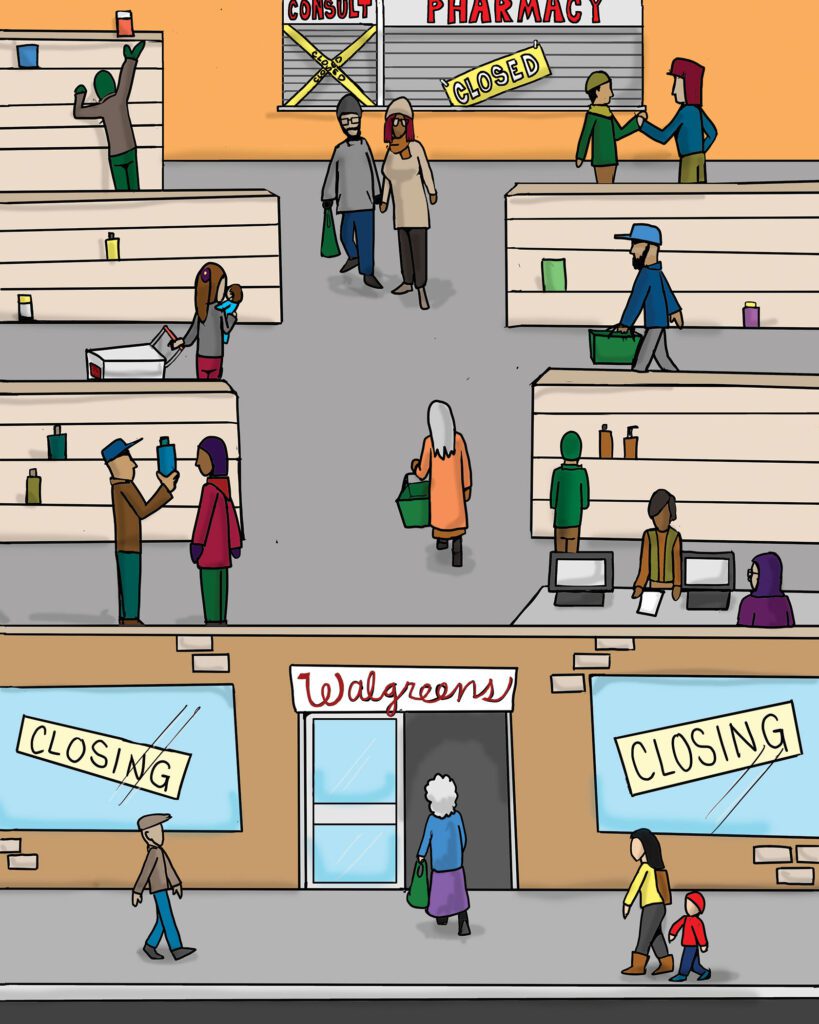
On Saturday, Jan. 6, residents and local leaders gathered to protest outside the Walgreens pharmacy on Warren Street in Roxbury that will close for good on Monday — Martin Luther King Jr. Day.
The planned closing seemed sudden to customers, many of them elderly, with little notice given to people who rely on the pharmacy services.
The shuttering is part of a downsizing by the struggling retailer. Walgreens had previously announced that it would close hundreds of stores by 2024. In Massachusetts, that includes a store in Worcester that closed last fall.
Closer to home in Boston, three other stores were padlocked in 2022 — on Washington Street in Roxbury, River Street in Mattapan and Hyde Park Avenue in Hyde Park.
These stores are situated in our neighborhoods, near the homes of our most vulnerable citizens, in many cases within walking distance. Losing them is also a huge blow for people who use public transportation to pick up their medicines.
There is another Walgreens on Columbus Avenue, and for now it remains open. But it is still too far away for too many vulnerable people.
It’s no secret that when corporations downsize, the first places they cut are in the Black and brown communities.
But Walgreens is more than just a store. It’s part of the neighborhood. It’s where residents get their health care screenings, key services, medicine and other essentials. It’s our community drug store.
The closings will have a cumulative effect, creating what some have called “pharmacy deserts” in communities that need them most.
Indeed, the number of pharmacies is shrinking. In previous years, big pharmacies saturated urban communities, but they’ve been beset by low-pay issues, bankruptcies and walkouts. Now they are shutting stores, creating a vacuum in our cities.
Nationally, roughly one out of every eight pharmacies closed between 2009 and 2015, a decline that disproportionately affected independent pharmacies and low-income neighborhoods, according to published reports that cited a study in the Journal of the American Medical Association.
Walgreens isn’t the only pharmacy downsizing. CVS, the largest U.S. pharmacy chain, announced in 2021 plans to close 900 stores by this year, the report said.
Walgreens said in 2019 it would close 200 stores, and in June announced an additional 150 store closures, the report said. Rite Aid reportedly said it would close roughly 400 to 500 stores.
The Communities of Color Coalition for Health Equity, whose mission is to address socio-economic inequalities, said the closing of the Walgreens on Warren Street would cause a “traumatic and negligent impact” on our seniors, single parents, and our youth, according to a letter the group wrote to Walgreens Boots Alliance.
The letter, which urges a delay in the closing, said many customers were caught off guard by the sudden notice — just two weeks — that the Warren Street pharmacy is closing. The next-nearest Walgreens is the one on Columbus Avenue, a hike for the elderly and the sick.
“Two weeks simply isn’t enough time to inform people they need to find alternatives for medical care. Additionally, the closure on Dr. Martin Luther King’s birthday is symbolic of the lack of respect for our community,” said the Rev. Miniard Culpepper about the closing.
The coalition, in its letter, said the removal of Walgreens from the neighborhood would deprive people of much-needed access to life-saving medications and support.
It urged Walgreens to extend the closing until July 15, adding that the later date would allow residents “to meet with Walgreens decisionmakers to come up with a comprehensive plan” that factors in residents’ needs and supports Walgreens’ self-expressed mission to health care.
Another protest was planned for this week.
Walgreens should listen to the coalition and meet with residents soon. It’s vital that even amid a downsizing, the company does not leave our community in a lurch.
This should not be an example of corporations putting profits over the needs of the people they long promised to serve.
It’s time Walgreens take a hard look at the damage it would cause if these stores close — damage that can’t be undone.







